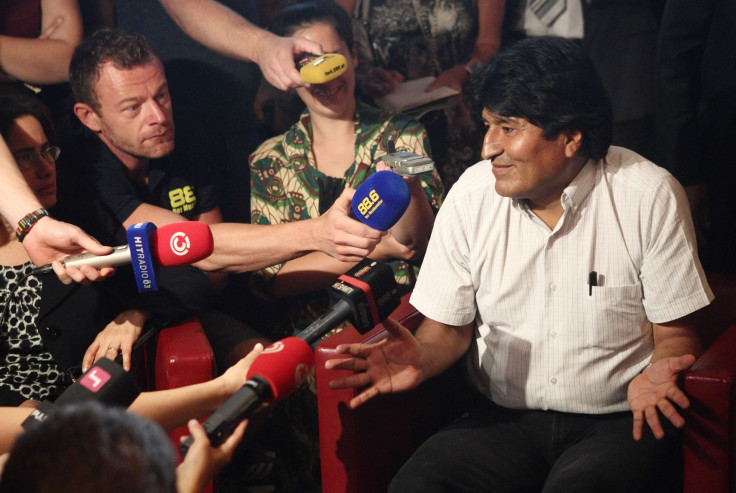Latin American Presidents Call Bolivia’s Evo Morales Plane Crisis An “Aggression”; Call For Regional Meeting

Edward Snowden might never make it to Latin America, but the NSA whistle-blower’s saga has now crossed the Atlantic -- along with Bolivia’s President Evo Morales, who had to make an unplanned stay in Vienna on Tuesday night after France and Portugal denied his plane permission to fly through their airspace, under suspicion that Snowden might be on it.
Austrian authorities searched the plane and confirmed that Snowden was not on board. The aircraft resumed its way to Bolivia through Spain’s airspace in the early hours of Wednesday. Irate Bolivian officials called the search a violation of international law and an act of aggression, though Austria said Morales had consented to it.
As the Bolivian presidential plane makes its way home, Morales’ neighbors have expressed their reactions to the event, and what they are saying is not pretty. Venezuela, Peru, Ecuador and Nicaragua have made their opinion on the matter clear, and are calling a meeting of the Unasur (South American Nations' Union) to discuss the issue.
Venezuelan Foreign Minister Elías Jaua, currently in Belarus on an official visit, bluntly called the refusal of overflying rights “fascist.” Jaua added that Caracas would do anything in its power to protect the dignity of Morales, a close ally of Venezuela, and asked for help from other countries in the region.
“If they are risking the life of a president, then I don’t want to imagine what they will do to Snowden if they catch him,” he added, clearly referring to the U.S.
His Ecuadorian counterpart, Ricardo Patiño, followed up on the call for a meeting and said joint action should be taken by all Latin American leaders. “This is an immense offense. Some are paranoid; some will have remorse. That’s not us, nor President Morales. It’s other people,” he said.
Ecuador’s President Rafael Correa expressed his outrage about the refusal of France and Portugal to let the Bolivian plane fly through their airspace. “There was no justification for that action. That incident could have put the life of Morales at risk,” he said.
“The denial by the European countries to explain themselves to La Paz adds insult to injury,” he stated.
Together with Peruvian President Ollanta Humala, who is the interim president of Unasur, Correa also filed a request for an emergency meeting of Unasur.
Argentine President Cristina Fernández de Kirchner announced on her Twitter account the request for the meeting -- which needs to be approved unanimously by all the members -- and added that Wednesday was going to be “a long and difficult day.”
Several other Latin American personalities expressed their support for Morales. Nicaraguan first lady Rosario Murillo condemned “the criminal action that put the life of a head of state in danger.” Argentine Nobel Peace Prize laureate Adolfo Pérez Esquivel said that the “diplomatic kidnapping” was a “pretext to scare, threaten and try to silence Latin America’s fight against corruption, domination and fascism.”
For its part, Bolivia wants the United Nations to conduct an investigation, said Bolivian Ambassador to the U.N. Sacha Llorenti.
In light of the furious reaction, the Portuguese government published a statement saying that Morales’ plane was not allowed to lay over in Lisbon due to unspecified technical problems, but that the aircraft was allowed inside Portuguese airspace at all times. France is yet to comment on the issue.
© Copyright IBTimes 2024. All rights reserved.











